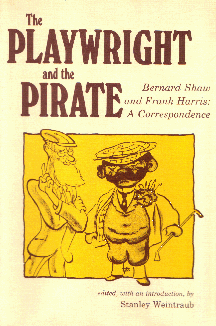 There is a type of Shaw scholar, of which Weintraub is one example, who cannot stand Frank Harris.
There is a type of Shaw scholar, of which Weintraub is one example, who cannot stand Frank Harris.
To them, Harris was an appalling, dreadful, low-life with whom Shaw only associated himself out of a form of intellectual perversity, his vaunted
paradoxical nature.
For such a one to edit a volume of correspondence between his hero and his bête noire, might seem something of a masochistic exercise, but it provides
plenty of scope for him to get out a favourite axe or two, and grind 'em. Not an opportunity is missed to denigrate Harris and interpret matters
in his disfavour. With this unsympathetic approach it is unsurprising that Weintraub is unable to shed much light on the reasons for Shaw's long
relationship with Harris. To him it is "less than a friendship but undescribable in any other way". He also invokes Shaw's supposed
"loyalty to his former editor", but Shaw had many editors in his long life and few of them were treated in the same way as Harris, with such a fond
indulgence, albeit coupled with exasperation.
The worst of it is Weintraub seeming to think Harris was somehow diminished by the fact that he and Nellie lived together for many years without being married(!),
and that Nellie was "extravagant" and a "termagant". No doubt Shaw, whose wife and marriage were practically invisible to the outside
world, was the better matrimonial model.
Disregarding Weintraub's slanted interjections, this is a valuable book for anyone interested in the characters of Harris or Shaw, gathering together
many notable letters often quoted in other sources, but rarely reproduced in full. Most of them date from the period
after Harris had left England for America, shortly after the start of World War I. By this
time he was on way down, while Shaw had already long been famous, rich and internationally acknowledged as a great writer. The contrast is marked, with Harris
often begging for literary crumbs from the great man's table to help his struggling career and fortunes,
while Shaw is supremely self-confident and condescending. Of course, Shaw's prose is as always
fluid and witty; Harris could not compete on that ground, and he does not attempt to.
Of particular interest is some of the material which would be worked into Harris' book on Shaw, particularly
an account of Shaw's early sex life, which he was later to bowdlerize, replacing for example 'copulations' by 'gallantries' and
'whore' by 'mistress'. Harris was annoyed at this, and declared that his 'squeamishness at this time of life will have you
laughed at as long as your name lives', and compared him to 'some old fogey who is writing a letter to the newspapers for the
first time and reads it to his maiden aunt, with a constant inquiry-- 'is it too strong?"'.
But Shavian coyness won out over Harrisian frankness, with the result that the book was to be uncharacteristically demure.
Despite Weintraub's best efforts, what one takes away from this book is Shaw's deep affection for Harris,
as exemplified by this 'epitaph': "Here lies a man of letters who hated cruelty and bad art, and never spared them in his
own interest. R.I.P."